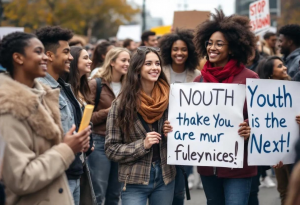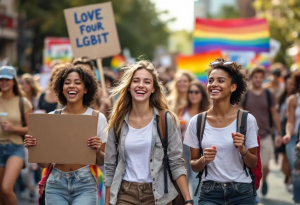
“Walang sinuman ang maiiwan.” No one gets left behind. This isn’t just a saying; it’s the driving force behind my work. As someone who grew up in Cebu, Philippines, I’ve seen firsthand how many young people struggle with their mental health, often in silence. Societal pressures and a lack of accessible support weigh them down. It’s time we change that.
We’re in the middle of a youth mental health crisis. The numbers tell a grim story: anxiety, depression, and even suicidal thoughts are on the rise globally among young people. But these statistics don’t capture the whole picture. Behind each number is a real person – a student, a friend, a family member – grappling with life’s challenges while fighting their inner battles. This isn’t just a passing fad; it’s a wave, and we need to give young people the tools they need to stay afloat.
But there’s hope. We can turn things around. Advocacy is key. We need to be strong advocates for youth mental health services and support. This means breaking down the stigma, raising awareness, and fighting for better access to mental healthcare for every young person, no matter where they come from.
Why Focus on Youth Mental Health?
Why youth, specifically? Because adolescence and young adulthood are crucial times for development. Mental health issues that pop up during these years can have long-lasting effects on their education, relationships, and overall well-being. Early intervention is essential, but often, young people don’t get the help they need because of stigma, lack of resources, or simply not knowing where to go.
Think about it: school, friendships, family expectations, and the constant pressure of social media – it’s a lot to handle! Now, imagine adding a mental health condition to that mix. It can feel impossible. That’s why advocacy is so important. It’s about creating a world where young people feel safe, supported, and empowered to seek help without feeling ashamed or scared.
Organizations That Are Making a Difference
The good news is, we’re not starting from zero. Many amazing organizations are already working hard to improve youth mental health. Here are a few examples:
- Active Minds: This group empowers students to talk openly about mental health in their schools and communities. They have chapters on college campuses all over the US, offering peer support and raising awareness. Their approach is simple but effective: creating a safe space for conversation helps reduce stigma and encourages people to seek help.
- Born This Way Foundation: Founded by Lady Gaga and her mother, Cynthia Germanotta, this foundation is dedicated to supporting young people’s well-being and empowering them to build a kinder, braver world. They focus on mental health, wellness, and creating a more accepting environment for everyone.
- The Trevor Project: This organization provides crisis intervention and suicide prevention services to LGBTQ young people. They have a 24/7 hotline, online chat, and tons of resources. The Trevor Project is a lifeline for many LGBTQ youth who face higher rates of mental health issues.
These are just a few examples. Many other organizations, both big and small, are making a real impact on young people’s lives. The key is to find one whose mission speaks to you and get involved.

The Power of Peer Support
One of the most powerful ways to improve youth mental health is through peer support. When young people connect with others who understand what they’re going through, they feel less alone and more able to cope. “Kapwa ko, mahal ko.” My neighbor, I love them. This Filipino value emphasizes the importance of community and support.
Peer support programs can be anything from casual chats with friends to organized group sessions led by trained peers. These programs give young people a safe space to share their feelings, learn how to cope, and build resilience. They also help reduce stigma by normalizing mental health challenges and encouraging people to seek help.
I’ve personally seen the amazing impact of peer support through my work with Kabalikat Para Sa Kabataan. We organized peer support groups for young people struggling with anxiety and depression, and the results were incredible. Participants said they felt less isolated, more hopeful, and more confident in managing their mental health.
Take Action: How You Can Make a Difference
So, how can you become an advocate for youth mental health? Here are some things you can do:
- Learn the Facts: Understand the mental health challenges young people face, the warning signs, and the resources available. Knowledge is power.
- Start Talking: Speak openly about mental health with your friends, family, and in your community. Share your own experiences (if you’re comfortable) to help break down the stigma.
- Support Organizations: Volunteer, donate, or raise awareness for organizations that are working to improve youth mental health. Every little bit helps.
- Advocate for Change: Contact your elected officials and urge them to support policies that promote youth mental health, like increased funding for mental health services in schools and communities.
- Be a Good Listener: Sometimes, the best thing you can do is simply listen to a young person who’s struggling. Let them know you care and that they’re not alone.
- Promote Education: Advocate for mental health education in schools, starting at a young age. This will help young people understand mental health, recognize the signs of problems, and know where to find help.
Overcoming Obstacles: Stigma and Access
Two major barriers stand in the way of better youth mental health: stigma and lack of access. Stigma stops young people from seeking help, and lack of access means that even when they do, they might not be able to find it.
To fight stigma, we need to change the way we talk about mental health. We need to use respectful and inclusive language, challenge stereotypes, and share stories of hope and recovery. We also need to create a culture of acceptance, where young people feel safe being themselves without fear of judgment.
To improve access, we need to invest in mental health services in schools and communities. This means hiring more school counselors, psychologists, and social workers; providing affordable mental healthcare options; and expanding telehealth services to reach young people in rural and underserved areas.
A Shared Responsibility: The Future of Youth Mental Health
The future of youth mental health depends on all of us working together. We all have a role to play in creating a world where young people feel supported, empowered, and ready to thrive. Whether you’re a parent, teacher, healthcare worker, or just someone who cares, your voice matters.
Let’s join forces to break down stigma, raise awareness, and improve access to mental healthcare for all young people. “Bayanihan.” This Filipino word means working together as a community to achieve a goal. Let’s embrace this spirit of bayanihan and build a brighter future for our youth, one where mental health is valued and prioritized.
Remember, walang sinuman ang maiiwan. No one gets left behind.
By Mateo Alcantara, Founder of a youth advocacy and networking website, and passionate advocate for youth mental health.

